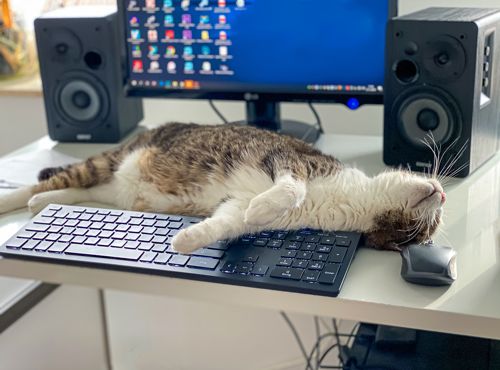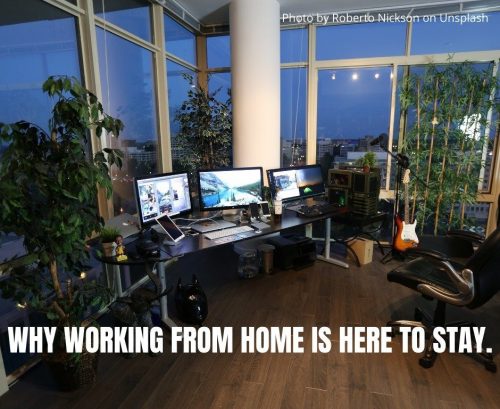Working from Home
Whether you HAVE TO or WANT TO, here’s what you need to know.
When you go to work, you’re immediately cocooned in a place especially designed to make you as productive as you can be.
Think about it: you can probably print a document and reach it without leaving your chair. All the small conveniences you get used to get through the day are within arm’s length.
Now look around your home. Unless you’re lucky enough to have a study, den or office, the chances are good that you’ll be spreading out your papers on the dining room table and working from there.
It’s that aspect of working from home that most of us dread: being trapped in a kind of limbo with one foot in the office and the other at home.
As more and more people choose to work from home we’re gradually figuring out what works and what doesn’t. Think: in 1995, only about 9 percent of US workers operated somewhere other than an office. Today, it’s more than 40 percent.
Firstly, here’s how to equip your space to make working from home easier.
Assuming you have all the necessary computer equipment, printers, copiers, binders and so on, let me look around my home office and see what else you need:
What about special furniture to work from home?
There’s no need to splash out on expensive furniture and fittings. Make sure you have a comfortable chair and a couple of desks or tables. We use trestle tables which are easy to move around, especially when we have a spring cleaning clear out.
A few simple shelves and some multi-tiered racks are essential. You can buy these from Amazon, Staples or your local office equipment supplier from around $50.00 up.

Make sure the racks have smooth-running and sturdy casters because you’ll probably be moving them around during the day and, when you’ve finished working, you may want to wheel them into another room.
Use them for holding books, magazines, files, pot plants, photographs and anything else that will clutter up your precious desk space.
(Money-saving tip: kitchen racks for vegetables work just as well as fancy office store items.)
You can’t work from home successfully without these tools and accessories.
These are the essential little helpers you never worry about until you can’t find one. You might think you can pop open a stapled document with a bread knife, but have some Band-Aids standing by.
In no particular order:
- Notebooks of various sizes
- Sketch pad
- Batteries for small appliances
- A stand for your cell phone
- Cell phone charger
- Paper clips
- Bulldog clips
- Staple gun(s) and staples
- Staple removers
- Post-its
- Clear Sellotape and parcel tape in dispensers
- Paper weights
- Headphones
- Computer screen wipes
- External speaker(s)
- Laptop stand
- Reference books
- Ink cartridges
- Printer paper
- Tissues and kitchen paper roll
- White board and markers
- Portable hard drive(s)
- NT Cutter for parcels
- Set of small screwdrivers
- Envelopes – various sizes
- Lever arch and files and folders
- Rubber bands
- Hole punch
- Map board and pins
- Boxes for pencils, pens, markers, emery boards, rulers
- Table lamp
- Folding knife with tools (Leatherman or Victorinox Swiss Army Knife)
- Picture/certificate frames
- Vacuum jug
- Coasters
It’s not easy, but try to keep these and other work items separate from anything you routinely use in your home. Small tools like knives, cutters and screwdrivers tend to migrate to the garage or workshop if not closely supervised.
To be successful when working from home, manage your time carefully.
The most important human quality needed to be effective in a home office is self-discipline. Ask anyone who does it regularly.
You must do this every working day:
Follow your morning ritual as though you were going to work as usual. If you would mostly wear a suit, a white coat, uniform or overalls you can give yourself a break from those.
More about how to dress for working at home later.
The transition to working from home is easier for some than for others, of course. Psychologists, tutors and other professional consultants can usually do it without a second thought.
You’ll notice, though, that they always have a home working space that’s separate from their living or family space.
They can literally close the door on their work at the end of every day.
Try as hard as you can to stick to your regular work schedule throughout the day. Break for coffee, lunch or exercise as usual but resist the temptation to call up your work-from- home friends for a long lunch or daytime drinks.
(Reward yourself with one or two exceptions to this rule if your timetable allows it, but make sure it doesn’t slide its way into your new routine.)
What should you wear when working from home?
You can dress as formally as you like but avoid going too casual. Much depends on the scale and style of your space and the kinds of people you might be meeting with on video links.
If you have a big room with plush, bulky furniture and your business is usually conducted quite formally, you might feel most comfortable in your regular workwear.
If you’re able to ‘dress down’ a little, you might prefer to go looser and more casual. However, unless you’re in the surfing business, keep the tee shirts and shorts for when you’re off duty.
It’s possible that you might be asked unexpectedly to a video meeting with someone important so having that in mind is useful when choosing your work-at-home wardrobe.

Under no circumstances, slop around in track suit or, even worse, pyjamas, unless you intend returning to bed after a few minutes’ work.
This may sound petty but it’s very important that you don’t allow working from home to dent your self-esteem, especially if circumstances have forced this move upon you.
What are the distractions when working from home and how do you avoid them?
If you have pets or children, working from home lets you enjoy each other’s company and, of course, you’re on hand in case of illness, accidents and so on.
But be sure to keep things as close to your work place experience as you can. If you allow domestic issues to steal too much time, you’ll be playing catch up all week and your deadlines will be threatened.
You must establish boundaries with friends and family from the beginning. Just because you’re working from home doesn’t mean you have time for minor household matters or long rambling phone calls with someone who’s having a quiet day. Be firm.
Unless you have to monitor news, weather or stock exchange prices, try to avoid the television or radio except for short periods at pre-arranged times. It’s okay, for example, to catch up on current affairs while having your lunchbreak. But leave the box sets where they are.
As you’re working without colleagues or supervisors nearby, you may find that routine tasks are taking longer than usual or that you forget about them completely. This is where your whiteboard, Post-its and notebooks will earn their keep. Write plenty of reminders if you find yourself slipping up.
If the day is dragging for whatever reason, take a short break, say 15-20 minutes. Walk around the garden if you have one or, to a neighbouring coffee shop.
If you’d rather stay inside, call up someone you know who also works from home and ask if it’s convenient to chat. Use the opportunity to seek or hand out advice on…the difficulties of working from home! A problem shared is a problem halved, they say. (And a joy shared is a joy doubled.)

How to work as a team when you’re all working from home
What happens to teamwork if some of the key players are missing?Teamwork is the essence of most successful business and professional practices. When you work from home you have to be even more diligent about managing or fitting in with your team’s dynamics.
How important are teams in today’s business world?
A survey of more than 1,000 team members across a range of industries showed that, when given the appropriate encouragement and leadership, they were 80 percent more likely to report higher emotional well-being.
And as a study from Warwick University in England confirms, happy employees are up to 20 percent more productive than unhappy ones. There isn’t a modern manager worth his or her pay cheque who doesn’t recognize how vital teams are for their business.
When some or all members are working from home, you have to create a virtual team. For this, you’ll need to agree some convenient routines. If you’re all dotted around the country or the world, you should meet at specified times on specified days. (Watch out for time zones, especially for overseas members.)
There are literally dozens of meetings apps suitable for two-person chats to large presentations. Use whichever options give you good quality face to face contact.
This is especially important because team building remotely doesn’t give us the same socializing opportunities as real time meetings. Our opportunities to really get to know our team members are really limited when we work from home.
Remember your discipline
- Meetings should follow this simple protocol: agendas must allow input from all team members and must be signed off and distributed at least 24 hours before the virtual meeting.
- Late additions to the agendas are allowed if time permits, otherwise they must be rolled over to the next meeting, making sure no important and urgent items are delayed.
- Use the Urgent/Important Matrix if necessary, also known as the Eisenhower Matrix. There are several references online.
- Double up on your listening skills when working from home. When you’re face to face in a live setting, you receive and interpret dozens of non-verbal cues, many of which will slip past you in a virtual environment.
- Due to the lack of non-verbal clues, you may miss some negative feelings or opinions from one or two attendees. Don’t let these go unremarked. If you suspect that someone is not comfortable with the way things are going, say: “Hey Mary and Jack: I could be dead wrong here but I’m getting the feeling you’re not a thousand percent behind this proposal. Share your concerns with us, please.”
- Appoint someone to capture all the important decisions or findings and circulate afterwards indicating the action required, by whom and when.
- Don’t let these regular meetings interfere with casual work or social water cooler type discussions that are a perfectly healthy part of our interaction with others at work.
Always remember, a learning worker uses knowledge to gain success.
Even if your working from home experience is a short one, share whatever you learn with your colleagues. It’s easy to see that earning your living remotely from your official place of work is a trend that’s growing at a furious rate.
It’s obvious why. Employers can cut cost-to-company expenses of every employee who works from home. They save on space, facilities costs, consumable supplies, parking, travel and food allowances, and much more.
On the other end of the scale, it works for most employees too. They get to spend more time at home (assuming that’s a happy space) but, more importantly, they don’t have to look busy every minute they’re at work.
They can indulge in the pleasure of thinking about what they’re doing without appearing to be daydreaming about the weekend.
In case you believe that thinking on the job is overrated, according to several surveys successful people should be spending up to one-third of their time thinking about not only the what but the why of their jobs.
If you’re forced to work from home, try to see it as an opportunity to manage your days differently.
There are things you’ll miss, of course. The camaraderie, the pressure, the sheer buzz of operating with a bunch of like-minded, talented people concentrating on a common goal.
But look at what you’ll gain by working at home:
- Provided you meet your deadlines, you’re free to set your own pace and schedule.
- You can take your breaks when it suits you.
- You’ll have uninterrupted thinking time.
- If you need to make personal appointments – nails, carwash, physio and so on – you won’t be impacting on anyone else’s schedule.
- Nobody will know if you throw your stapler at the wall!
- You can have your kids and pets around as long as they’re properly controlled.
- Crank up the heavy metal, chill to your favourite whale songs or work in perfect silence, the choice is yours.
- If you’d like to join your buddies for beers after work, you can shut down early as long as you’re on top of your deadlines.
Once you’re a few weeks into working from home, or working remotely if you think that sounds more professional, you’ll find many more things to like about it and, inevitably, a few you don’t.
Having done it successfully for a year or more, most people returning to the traditional working environment find it a little too structured. They miss the freedom to manage their time and resources in a way that suits them, their friends and their families the best.
How to work effectively from home: our 10 hot tips.
- Reframe any negative feelings by treating it as an opportunity to work for yourself combined with the security of a regular salary.
- Consult with family or housemates about your needs for privacy and noise control during your working time.
- Don’t feel insecure about taking more short breaks than normal, especially if you work with a computer. There’s almost no doubt that you don’t break away often enough in your usual work place.
- Here’s something you’ll only learn here or from experience. When you have those video conference calls, what’s behind you? When the camera is looking at you, what else does it see? Manage that space so that nobody sees your political posters tacked to the wall or the plumber unblocking your sink.
- Use the flexibility you can build into your work from home schedule for constructive activities that your previous routine made difficult. Reading and thinking more, and working on your fitness spring easily to mind.
- Expect to work a little harder on maintaining relationships with work colleagues and with third party stakeholders. Make an effort to maintain comfortable levels of contact using all the communications media you have available.
- Some people take longer to adapt to working from home than others. Be on the lookout for colleagues who might be struggling at first. Offer them support and encouragement.
- One thing we all miss when working at home is the casual mentorship that goes on often without our noticing. For example, a co-worker notices you struggling with a computer glitch and happily pulls up a chair and fixes it for you. At home, that’s unlikely to happen, so you’ll need to focus more on building and maintaining a network of collaborators to fill those gaps.
- Social media and Google are no longer your best friends. Unless you’re a robot, you’ve experienced the sudden jolt that hits you like a mild electric shock when you realize you’ve been screen sucking for 45 minutes. You don’t have to be a recluse. But you do have to impose strict limits on your non-productive navel gazing.
- It doesn’t matter where you work – office, factory, building site, surgery, government department, pizza joint – sooner or later you have to get the heck out even for five minutes. That’ll happen when you’re working from home, too. So take a short break if you haven’t done so for a while. Or, if it’s just a change of scenery you need, take your work to a coffee shop or a park bench or a shopping mall. You’ll soon be ready to return to the comfort of working from home.
If you liked, then please subscribe to our YouTube Channel for video content. You can also find us on Twitter, Facebook, Instagram and Linkedin.
You will also like
Afraid you’ll get bored working from home? Then you may be interesting in reading: Your biggest danger at work might be boredom.
Watch 10 quick-fire videos with important tips for adjusting to life back at work. Getting Back to Work After the Lockdown
Read more articles from our weekly series
The Business Mentor





